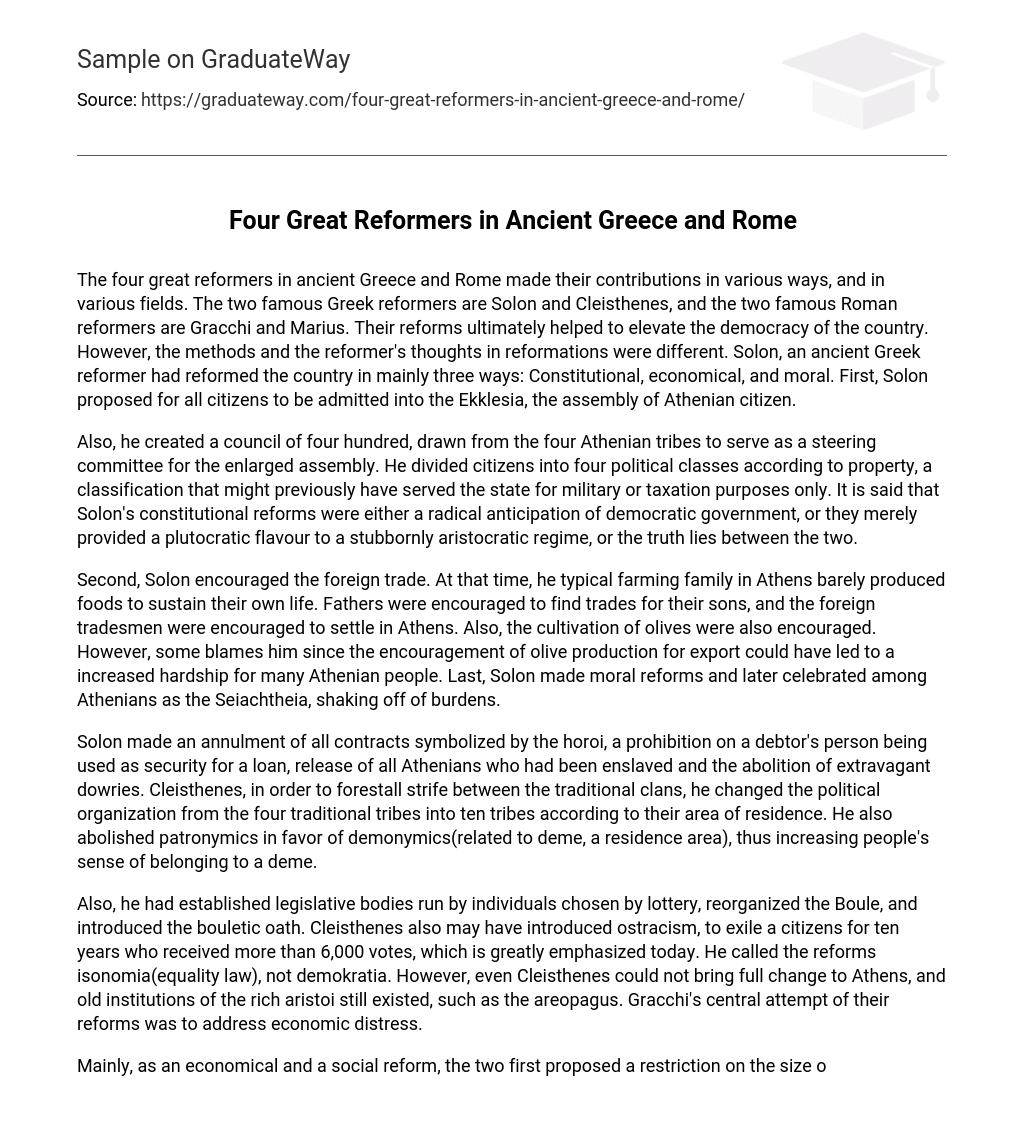The four great reformers in ancient Greece and Rome made their contributions in various ways, and in various fields. The two famous Greek reformers are Solon and Cleisthenes, and the two famous Roman reformers are Gracchi and Marius. Their reforms ultimately helped to elevate the democracy of the country. However, the methods and the reformer’s thoughts in reformations were different. Solon, an ancient Greek reformer had reformed the country in mainly three ways: Constitutional, economical, and moral. First, Solon proposed for all citizens to be admitted into the Ekklesia, the assembly of Athenian citizen.
Also, he created a council of four hundred, drawn from the four Athenian tribes to serve as a steering committee for the enlarged assembly. He divided citizens into four political classes according to property, a classification that might previously have served the state for military or taxation purposes only. It is said that Solon’s constitutional reforms were either a radical anticipation of democratic government, or they merely provided a plutocratic flavour to a stubbornly aristocratic regime, or the truth lies between the two.
Second, Solon encouraged the foreign trade. At that time, he typical farming family in Athens barely produced foods to sustain their own life. Fathers were encouraged to find trades for their sons, and the foreign tradesmen were encouraged to settle in Athens. Also, the cultivation of olives were also encouraged. However, some blames him since the encouragement of olive production for export could have led to a increased hardship for many Athenian people. Last, Solon made moral reforms and later celebrated among Athenians as the Seiachtheia, shaking off of burdens.
Solon made an annulment of all contracts symbolized by the horoi, a prohibition on a debtor’s person being used as security for a loan, release of all Athenians who had been enslaved and the abolition of extravagant dowries. Cleisthenes, in order to forestall strife between the traditional clans, he changed the political organization from the four traditional tribes into ten tribes according to their area of residence. He also abolished patronymics in favor of demonymics(related to deme, a residence area), thus increasing people’s sense of belonging to a deme.
Also, he had established legislative bodies run by individuals chosen by lottery, reorganized the Boule, and introduced the bouletic oath. Cleisthenes also may have introduced ostracism, to exile a citizens for ten years who received more than 6,000 votes, which is greatly emphasized today. He called the reforms isonomia(equality law), not demokratia. However, even Cleisthenes could not bring full change to Athens, and old institutions of the rich aristoi still existed, such as the areopagus. Gracchi’s central attempt of their reforms was to address economic distress.
Mainly, as an economical and a social reform, the two first proposed a restriction on the size of the land to lessen the gap between the rich and the poor. Then they proposed the emigration of landless farmers into foreign agricultural colonies. Lastly, they proposed making poor in Rome to buy the cheap wheat from the country, instead of to buy from other retailers. The foremost of the Marian reforms was the inclusion of the Roman landless masses, the capite censi. men who had no property to be assessed in the census.
He arranged for the state to supply them with arms. With little hope of gaining status in other ways, the masses flocked to join Marius in his new army. Secondly, he formed a standing army, since he was able to standardize training and equipment throughout the Roman legions. Thirdly, he introduced a legislation that offered retirement benefits in the form of land grants. Finally, Marius granted citizens of the Italian allies (Etruria, Picenum etc. ) full Roman citizenship if they fought for Rome and completed a period of service in the Roman army.
Solon and Cleisthenes, even though of their popularity and supports from masses, brought many uncertainties and doubts such as its extremeness, or its successfulness. The special thing about Gracchi is that they fought for poor citizens even though they were born in one of the highest classes. Consequently and sadly, the two were killed by his same classes. Compared to Gracchi, Marius wasn’t born as a high class. However, the four both supported the democracy of a wider state of thought.





